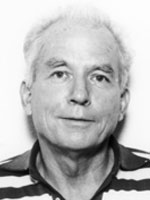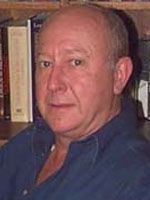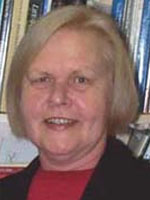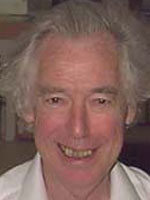Memorials
This page is dedicated to staff who are no longer with us.
Staff memorials can be found here, as well as eulogies from staff members who knew them best.
-
Professor Ian JohnBorn in 1931, passed away in 2013

Ian John was an academic in the Department (now School) of Psychology at the University of Adelaide from 1965 until his retirement in 1996. First appointed as a lecturer, he was subsequently promoted to senior lecturer (1969), reader (1972) and professor (1973). He was Chairman of the South Australian branch of the Australian Psychological Society in 1973 and Chairman of the Department of Psychology during 1975-76. On retirement he was awarded the title Professor Emeritus by the university and he simultaneously held a position of Visiting Research Fellow within the School, consistent with voluntary contributions that he continued to make to the School's teaching and research activities until his death from cancer in 2013.
Ian attended Walkerville and Nailsworth Primary Schools and after completing his secondary education (Adelaide High School; Leaving Certificate) he graduated from Roseworthy Agricultural College with a Diploma of Agriculture before moving to Europe in 1952, principally Denmark, where he worked in farming, became fluent in Danish and met his future wife Birte. Back in Australia by 1954, he first completed a Diploma in Social Science (1956) at the University of Adelaide and then a Bachelor of Arts with Honours in Psychology (conferred 1960) and a Master of Arts at the University of Melbourne (1961) where he was also employed as a tutor. His first permanent academic position was as a lecturer at the University of Newcastle (1962-4) but after taking up his appointment at Adelaide in 1965, he completed a PhD (1967) in the area of experimental psychophysics under the supervision of Professors Malcolm Jeeves and Ken Provins. His research activities in this field continued until 1979 when, following a year's study leave in the UK and Europe, he became interested in the critical examination of the philosophical, methodological and ideological bases of the discipline. From that point on his primary research interests centred on metatheoretical questions about the nature, production and application of psychological knowledge.
During the 1980s and 1990s Ian John published a series of influential papers in the Australian Psychologist (see below). These papers critically examined epistemological issues in the production of psychological knowledge and the nature of the scientist-practitioner model which had come to dominate the training of clinical practitioners in the field. Ian's work became increasingly influenced by the social constructionist movement in psychology and in particular by critical theorists such as Ken Gergen, Edward Sampson and Michael Billig. His enthusiasm for these revolutionary ideas that questioned the claims of objectivity and neutrality upon which the discipline of psychology had been built led to the establishment of the 'Meta-theory Discussion Group' which met every week within the Department of Psychology to discuss the implications and limits of these radical ideas. These became lively and scholarly debating forums between traditional experimentalists and a small number of younger academics and postgraduates who were enthusiastically embracing the 'critical turn' in psychology.
Last but not least, Ian John was an inspirational mentor to both students and colleagues. His intellectual influence and legacy continues today. Although the Meta-theory discussion group wound up when Ian retired, Ian's protégés established the Discourse and Rhetoric Unit (DARU), and more recently, the Discourse and Social Psychology (DASP) Group. His third year psychology course 'Metapsychology' continues to be taught today by Amanda LeCouteur and Martha Augoustinos, albeit under a new name, Psychology, Science & Society.
John, I. D. (1984). Science as a justification for psychology as a social institution
Australian Psychologist, 19, (1), 29-37.John, I. D. (1985). The identity prescription of "the psychologist"
Australian Psychologist, 20, (2), 123-142.John, I. D. (1986). "The scientist" as role model for "the psychologist"
Australian Psychologist, 21, (2), 219-240.John, I. D. (1990). Discursive style and psychological practice
Australian Psychologist, 25, (2), 115-132.John, I. D. (1991). Differences in Scientists' Discourse About Scientific Fraud and Impropriety
Australian Psychologist, 26 (2), 120-122.John, I. D. (1994). Constructing Knowledge of Psychological Knowledge: Towards an Epistemology for Psychological Practice
Australian Psychologist, 29, (3), 158-163. -
Professor Douglas VickersPassed away on 31st of October 2004

Douglas Vickers was an outstanding scholar and researcher whose 1979 book 'Decision Processes in Visual Perception' is now regarded internationally as a classic. He joined the then-Department of Psychology at the University of Adelaide as a Lecturer in 1967, having received an MA in Mental Philosophy from the University of Edinburgh, and a BA in Natural Sciences and PhD in Experimental Psychology from Cambridge University. At the time of his death, he held the post of Professor of Psychology.
His research interests were far-ranging, including perception, memory, judgment, problem-solving, intelligence, language and aesthetics. Among his many professional distinctions, he was a Fellow of the Academy of the Social Sciences in Australia and a former President of the International Society for Psychophysics.
In 1994 he had been awarded the ScD in Biological Sciences by the University of Cambridge, one of the very few psychologists worldwide to have held this award. His sudden and unexpected loss is sadly felt by those many colleagues and students who had the pleasure of working with him.
Professor and Deputy Head, 1967-2004
-
Ms Inara ProskePassed away on 13th November, 2000

Inara Proske passed away on the 13 November, 2000. She was just 56 years of age.
Inara joined the University in 1967 as a tutor in Psychology, and also held the appointments of Senior Teaching Fellow, Senior Tutor and Lecturer B during the nearly 34 years she spent with us in this Department.
She was an extraordinarily dedicated teacher and will be greatly missed by her students as well as by those of us who loved her as an academic colleague and friend.
-
Dr Frank DalzielPassed away on 21st May , 1999

"Now that we have started saying goodbye and farewell to Frank, there is a sense that a lot of people who have been close to him over the years will hear, all too late, of his passing. All of these people have something to contribute to our memories and might appreciate a way of being included in an ongoing memorial.
I think most people would agree Frank didn't have much time for computers himself, but I wonder whether his sense of humour might have seen the funny side of having a web-page being developed and maintained in his honour. His many students and colleagues spread far and wide around the globe could share stories with us and we with them, thus keeping something of Frank's contribution alive. It may also serve as an inspiration to other students, teachers and mentors who happen to access the site."
Garry RaymondHistory
- Aberdeen Grammar School, University of Aberdeen - MA(Hons), 1956
- University of Aberdeen - PhD, 1960
- Sheffield - Clinical Psychologist, 1961
- University of Indiana - Post-doctoral Fellow, 1961-1962
- University of Adelaide - Lecturer, 1963-1966
- University of Adelaide - Senior Lecturer, 1966-1999
Eulogy for Frank Dalziel by John Brebner
It is with sadness that we are here to farewell Frank, but, as we know he would have wished, we are also here to celebrate his life with happy memories. In my few minutes I will talk about Franks early years, and a little about Frank in his last months. Let me start with Frank as a student. His schooling was at Aberdeen Grammar School which, if you asked if it was one of the old Grammar schools, he might tell you was founded in the year 800, sometimes adding A.D.. That was his way of letting you know he was not being pretentious, and Frank was never pretentious. He also revelled in the knowledge that the Grammar Schools most famous Old Boy was that mixture of poet, soldier, and reprobate, George Gordon, Lord Byron.
Frank went to Aberdeen University in 1953 where he took a First Class Honours degree in Psychology and then his Ph.D. Aberdeen University had 1850 students then, and more academic staff than Adelaide University has now. It was a leisurely life. Wednesday afternoons were reserved for sport, which meant Frank went to the pictures or watched TV. There were hour long coffee breaks mid-morning and afternoon at the Auld Toon Cafe, and an even longer lunchtime to allow students time to travel between the two campuses. During these breaks,which, through the reinforcing effects of coffee and food, set a pattern for Frank that some of you will recognise, he would amuse us and on one occasion, I recall, regaled us with his theory about his dog Tims erratic behaviour. Tim behaved normally most of the time but occasionally became violently aggressive if he met any black and white dog. Franks explanation was that Tims eyesight was failing, and when he saw a black and white dog it looked like a black dog with bites out of it! And that was how Franks interest in animal behaviour began.
Frank could always make anything funny, no subject was safe from his humour. He became one of the scriptwriters of the student shows, musicals really, that used to run for a week at His Majestys Theatre with the proceeds going to charity.

But Frank also had another existence. Every summer he would don a dark blue uniform with silver buttons, a peaked cap, and strap his equipment round his waist. Then he was ready to board his transport and call out, Fares, please. He was a tram conductor during the long vacations. Many students, including my wife Jill and her sister, would miss several trams until Franks came along to enjoy his humour and banter with the passengers on the way down to the Sea Beach. Naturally, Frank let his friends and acquaintances travel free of charge, and the money he collected rarely matched the tally of tickets sold. He tried explaining to one inspector that, statistically, on average, over time, the mistakes would even out and his takings would match the machine. The inspector was impressed and said, "You're probably right, but until that happens well just keep on taking any shortfall out of your wages". Im not sure I ever believed Franks claim that on two separate occasions, instead of drawing wages, he had to pay the Tramways Corporation.
When Frank finished his Ph.D. he didnt have to do National Service because the medical examiner happened to be Franks GP who warned him that any sudden increase in weight would be grounds for an exemption. Frank happily ate his way from 10 stones something to 13 stones something more in no time at all. The only problem was that he found that reinforcing too, and didnt stop there, so for most of the next quarter century Frank was physically as well as psychologically larger than life. Franks first job as a psychologist was a six-month spell in Sheffield, where he was a trainee clinical psychologist. What would have happened if Frank had stayed as a clinical psychologist I cannot imagine! He would probably have invented Humour Therapy which would be like Aromatherapy with jokes instead of smells. After Sheffield, Frank went to Indiana University before being appointed to a lectureship at Adelaide. His association with Indiana continued throughout the years and he made frequent return visits on study leave usually via the three great metropolises Athens, Rome and Aberdeen.
Franks humour was sorely tested by his illness, but it never left him. At St Andrews when they were taking a record of his illnesses he mentioned he had a burn on his foot and a broken tooth, hence, he had foot and mouth. Or, when his hair started to grow back after chemotherapy, I said, Your hair is growing back curly, Frank. One of his lady helpers, Trisha, appeared and Frank said, My hairs growing back curly. Trisha came and looked and said, Its not. To which Frank replied, But it will when it gets to the bend!. Later, in College Grove, when one of the nurses was urging him to relax and asked, Are you able to relax? His response was, Well, it got me through school. It was also while Frank was in College Grove that I took some of his magazines to him and I noticed that he received, not one, but two copies of Choice. So, I asked him, Why do you get two copies of Choice? His reply was, You need two to have choice!
Frank amused and entertained everyone, but he was also very well informed on many subjects from Ancient History to Current Affairs, and that combination meant that Frank was always good company whether he was being funny or serious. He was always interesting and never dull, and we will miss him.
Frank was also stoical. As long as he could, he preferred to ignore his illness and concentrate instead on more positive aspects of his life. It wasnt until he lapsed into a coma that his diabetes was discovered, and then it turned out he had not seen a doctor for 15 years! As his illness progressed Frank appreciated the help he received from many people, especially Nancy, his sister, who greatly comforted and supported him in the last weeks of his life. I know that Frank would want to thank his doctors, Mr Stephen Graves his orthopaedic surgeon, Dr Jack Russell his oncologist, Dr Jack Long who treated his diabetes, and Meg Hegarty from Mary Potter Hospice, and the many nurses who were kind to him in hospital. Frank would also have a special word of thanks to Mary and Trisha who helped him restore his flat to its current glory which gave him a lot of pleasure in recent years. Its just a pity Frank couldnt have enjoyed it for many more years.
Eulogy for Frank Dalziel by Tony Winefield. The Frank I Knew
Frank and I both arrived in Adelaide in 1962. We had applied for the same job and we both got it (he at the first attempt and I at the second). Things were very different in those days. We shared similar views of the world and about psychology, and we enjoyed the same TV shows, laughed at the same things, and we soon became good friends.
Frank was well known superficially to many people who frequented the University of Adelaide Staff Club, as a large, jovial Scotsman, who was always happy, always laughing, and always surrounded by a noisy circle of friends at lunch-times. To his friends, however, who came from all parts of the University, there was far more to him than that. Of course they were attracted to him because he was fun to be with. But they also admired him because he had a wonderful sense of humour, (although I never once heard him tell a joke), because he had a devastating wit (although he was rarely cruel), and because he possessed extraordinary insight and a vast knowledge of almost any subject you could name. His conversation (like his teaching) was amusing and informative.
The table in the old Staff Club where Frank regularly lunched from noon each day, after first collecting a carafe of red wine from the bar, was Table 4 (all the tables were numbered). For years after the Club moved to its current venue, and where the tables are not numbered, the table where Frank sat was always known as Table 4. Table 4 was notorious in the eyes of some and was referred to it as 'the cynics table'. Junior academics were warned to avoid it on the ground that being seen there could damage their careers.
His sense of humour was irrepressible. He would certainly have roared with laughter at the funeral notice in Saturday's paper which referred to his "Family and Friend". He would have wondered which one of us it meant.
Frank's main passions were animal behaviour, history, and politics although he was knowledgable about many other subjects (even those, such as theatre, sport and classical music, in which he claimed to have no interest). Unlike some professional historians, Frank was interested in all eras, from pre-history and classical times, to the middle ages and modern times. As a student of animal behaviour he no doubt regarded history as a branch of psychology - concerned with the behaviour of dead animals. He once gave a Departmental seminar with that title. It was about dinosaurs. His interest in the evolution of behaviour could be seen as a marrying of psychology and history.
He was intensely interested in politics and deeply affronted by injustice, intolerance, and anti-democratic regimes. As a lover of Greek history and culture (including its food and bazouki music) he was contemptuous of the Greek Colonels' coup and once remarked during their regime, that Constitution Square in Athens should be renamed Unconstitution Square.
Although Frank was a gentle and tolerant person, he had a healthy irreverence for authority and despised pretentiousness. Like George Orwell who was one of his favourite writers, he had no time for cant and humbug, although, unlike Orwell he used humour - mockery and ridicule- as his main weapons against them. He enjoyed taking the micky out of the pompous, sanctimonious and hypocritical.
Within the Psychology Department, Frank regularly held court at morning and afternoon tea breaks in much the same way as he held court at Table 4 at lunch-times. Again he was always surrounded by an enthusiastic audience of colleagues and postgraduate students whom he would regale with accounts of the absurdity of last night TV shows, or the ludicrous pronouncements of some public figure (usually a State Premier).
Of all the academics I have known, I can think of none who was more devoted to his students than Frank. He was a brilliant and inspirational teacher who was rewarded by attracting outstanding students who returned his loyalty and devotion. Many of the students whose research theses he supervised have gone on to successful careers, both his Ph.D and his Honours students many of whom won scholarships in order to do their Ph.D research at prestigious overseas universities. I planned to name some of them in this talk. At least I thought I might mention Frank's first Ph.D student, but she advised me not to do so on the ground that it would be invidious to mention some without mentioning all of his research students. Eventually I deferred to the wishes of 'She Who Must Be Unnamed'. (Rumpole was one of his favourite television characters).

A few years ago I offered to nominate Frank for the teaching excellence award that he so richly deserved. He was grateful, but basically scoffed at the idea. He knew, and the people who mattered to him all knew, that he was a brilliant teacher. That was enough for him.
Although he was very sociable, Frank was an intensely private man. He hated to talk about himself (unless it enabled him to relate an amusing anecdote), and he never complained. Even in the last few weeks of his illness he hardly ever complained of being in pain (except to his medical carers). Any attempt to discuss serious personal matters would be deflected by a facetious comment or by a swift change of subject. Many of Frank's closest friends would often wonder whether he was ever lonely or sad. Others wondered how he managed to find the time to read so widely when he seemed to spend all his spare time eating, drinking, carousing, or watching TV. All I can say is that I can't answer either of those questions.
Nancy asked me to help her choose today's music and we thought we might find something suitable among Frank's CDs. We suspected that he had a secret liking for classical music. On one occasion when I visited Frank recently I was surprised to find the TV set off and a CD playing. I was even more surprised to find it was Wotan's farewell to Brunnhilde from The Valkyrie. I was surprised because one of Frank's favourite Mark Twain aphorisms was: "Wagner's music is better than it sounds".
We were amazed to find a collection of around 60 CDs and several hundred cassettes. We weren't surprised by the Greek bazouki music, the Fred Astaire dance tunes, the Andrews sisters, Elvis Presley, Glenn Miller and George Gershwin records, but we hadn't expected all the romantic music by Elgar, Dvorak, Sibelius, and Tchaikovsky and the operatic music by Verdi, Puccini and Wagner. All of today's music comes from Frank's own collection. We chose the first because we guessed that Tchaikovsky's 5th Symphony must have been a great favourite. He had 4 recordings of it.
We chose Ol' Man River because it was a childhood favourite of Frank and Nancy and also because it expresses the compassion Frank felt for the poor, and his hatred of racism. One of his anecdotes was about an Aberdeen taxi driver who drove him on one of his early visits home. Hearing that Frank was from Australia, the driver began to wax lyrical about the 'White Australia Policy'. Frank said nothing, but at the end of the journey, handed the driver the exact fare, explaining curtly, 'we don't tip in Australia'.

The final piece (Flower of Scotland) needs no explanation.
To many of us, Frank's life symbolised a happier time: a time when Australian universities were cherished by politicians; when collegiality was widely valued and widely practised; when reading, thinking and discussing ideas were not seen as a waste of time; when academics were respected for making an important contribution to the intellectual life of the community; when education was valued for its own sake and not treated just as a marketable commodity; when research was driven by curiosity not by the requirements of big business; and when academic freedom was not threatened by philistines.
Finally, on behalf of all his friends, I'll say what I could never have said to his face:
"Frank, we loved you because of the joy you brought into our lives. We'll never forget you because your memory will continue to bring joy and laughter into our lives. But we'll always miss you".
Message from Nancy White
Frank was a funny, wonderful person who made Animal Behaviour a subject one never forgot. I am also from Scotland and enjoyed discussing the weather with him whenever we caught up with each other. Frank contributed to the richness of life of all of those who met him. Sadly missed. Love always, Nancy White.
Message from Peter Delin
It is hard to believe Frank is gone. Every day I catch myself thinking "Frank would be interested in that," or "Frank would know about that". He was a good friend and an endlessly entertaining companion. His good humour was totally reliable. His knowledge in an extraordinary range of areas was encyclopaedic. His concern about any socially important issue was guaranteed. In many ways, Frank was a shining model. I have never met anyone who was as consistently sure of himself. He never doubted that what he was doing was worthwhile and, once he had decided how best to do it, he never wasted time vacillating or re-thinking, but just got on with it. Similarly, he never doubted his world-view. What was desirable was worth any amount of effort, and what was undesirable was to be attacked with all the weapons at his disposal.
Particularly undesirable were any form of prejudice or descrimination, and pretentiousness in any form, and he constantly attacked them with his most potent weapons; his puckish humour and irreverence. There were no sacred cows - even religion was not immune. I shall always remember his "Well I may BE God, so watch it!".
Some ten years ago, I wrote the following clerihew, encapsulating a typical conversation with Frank on the subject of religion. It seems curiously relevant and appropriate now:
"Frank Dalziel
Does not believe in a personal heaven or hell.
He says The Great Skinner would never give endorsement
To such a post-mortuum extension of the concept of operant reinforcement." Peter Delin, 22-9-99
